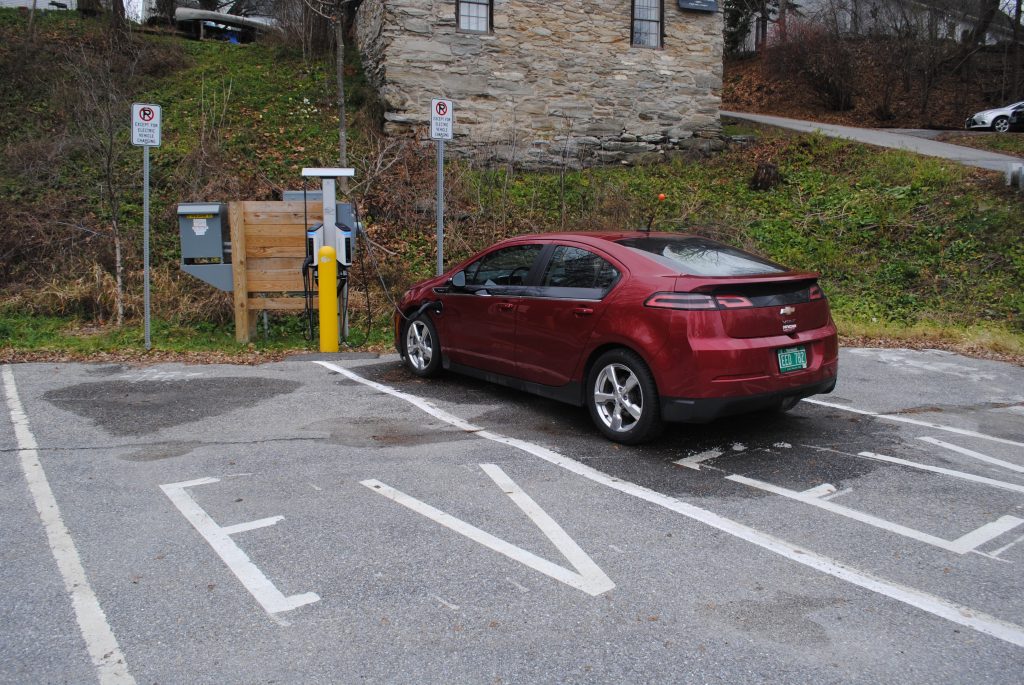
Pictured: An American-made Chevrolet Volt charging in downtown Middlebury.
A Green Mountain Power rebate spurring Vermonters to buy vehicles that use the utility’s electric power has company executives crowing — and at least one critic groaning about corporate profit motives.
The EV rebate program, which kicked off in March, has GMP’s top executive excited.
“We’re thrilled to partner with customers to help them make the switch to greener driving with these new rebates,” Mary Powell, the power company’s president and CEO, said in a statement. “The number one cause of carbon emissions in Vermont is fossil fuel powered vehicles, so doing our part to help customers switch to the cleaner convenience of EV driving will make a difference for the state and the planet.”

Mary Powell, president and CEO of Green Mountain Power: “The number one cause of carbon emissions in Vermont is fossil fuel powered vehicles, so doing our part to help customers switch to the cleaner convenience of EV driving will make a difference for the state and the planet.”
The program offers up to $2,500 in rebate deals. The company reports that 21 of the rebates were “extra incentives for low-and-moderate income customers.”
Since March, the utility has helped customers purchase or lease 88 all-electric vehicles, including so-called plug-in hybrids.
According to GMP-rebate customer Mike Skuro of Woodstock, the deal saves money and makes one feel good about the environment.
“The carbon and cost savings are wonderful. I drive a lot for work and having my new EV is making a difference,” Skuro said. “Over the last few weeks of driving electric, I’ve probably offset 60 gallons of gas so far. With my old SUV I would have filled up multiple times.”
Skuro also signed up for GMP’s free Level-2 EV charger, which lets him charge his car over several hours at his Woodstock home.
But not everyone views the program as an act of altruism or corporate social responsibility.
John McClaughry, vice president of the Ethan Allen Institute, a free-market think tank based in Montpelier, sees old-fashioned profit motives at work — ones that advance political and corporate agendas.
In an interview with True North, McClaughry said electric vehicles are not well suited for Vermont’s rutted, muddy back roads. He also said New England’s cold winters diminish EV battery capacity by as much as 35 percent, a factor rarely discussed by GMP or its green-energy partners.
“Like electric heat pumps, more electric cars in Vermont means more revenues and profits for Green Mountain Power, especially when the state government is financing the necessary recharging stations,” McClaughry said. “So there’s a business justification for luring customers with an EV purchase bonus.
“Of course, if the GMP customer buys the EV, pockets the bonus, and decamps for Florida where the EV will perform a lot better, GMP will be facing a dead loss. Another benefit: the Vermont Energy Action Network, which is clamoring for an increase from the present 3,000 to 90,000 EVs by 2025, may give GMP an award, justifying another press release.”
In response to McClaughry’s comment, GMP spokesperson Kristin Kelly said the company is not aware of its EV-rebate customers decamping the state for better savings.
“What we’re doing is encouraging Vermonters, providing them the choice to cut their carbon footprint,” she told True North. “The largest source of carbon emissions in the state is transportation. Our rebates are about helping Vermonters to make the switch to greener driving if that’s what they want to do.
“If more Vermonters are charging up in the GMP territory, it actually helps to lower costs for GMP customers. … This [along with the home stored-energy program] is all about lowering costs to GMP customers.”
David Roberts, of Drive Electric Vermont, a group dedicated to increasing electric transportation throughout the state, says fueling a vehicle with electricity costs less than gasoline. Plus, there are alleged maintenance savings over the years you operate the EV.
Not surprisingly, he takes issue with skeptics like McClaughry.
“Typically an EV running on electricity is the cost equivalent of $1.50/gallon gasoline,” he said. “We found the average Vermont driver could save $2,400 driving on electric over the past five years.”
According to Roberts, additional savings may be possible as some utilities are passing through cost savings associated with off-peak charging.
“An example is Burlington Electric Department’s $0.08/kWh [kilowatt hour] rate for EV charging done between 10 p.m. and noon the following day — this is the cost equivalent of about $0.60 per gallon of gasoline.
He offered specifics on ways in which EVs may have lower maintenance costs than comparable gasoline vehicles.
“All-electric options in particular do not have internal combustion engines and so avoid the need for oil changes and other related issues,” he said. “The regenerative braking systems save wear and tear on brake components by turning electric motors into generators and storing electrical energy back in the battery when braking. Battery replacement/service costs could be significant in the long term, but automakers usually offer 8-year/100,000-mile battery warranties and for the most part batteries do seem to be holding up well over time.”

John McClaughry is vice president of the Ethan Allen Institute.
Despite the hype from green advocates, auto makers and even state legislators, McClaughry isn’t necessarily taking the bait.
“EVs do not come without problems,” he wrote in one commentary. “Even though 13 manufacturers now offer vastly improved EVs with greater ranges and lower prices, and the $7,500 Federal tax credit is still available, there has not been a rush to buy EVs. Most of the EVs sold are bought by high-income purchasers. A 2015 study found that buyers of the lower-cost Ford Focus EV had an average household income of $199,000, more than three times the U.S. median household income. Tesla owners’ incomes averaged $293,200.”
McClaughry also cautions that EV powertrain repairs require expert technicians and do not come cheap. Plus charging an EV requires both time and patience — EVs do not provide the “gas-and-go” advantages conventional private and commercial vehicle operators are used to.
“Even where a charging station is convenient, there can be ‘charging time trauma’,” McClaughry wrote. “Public charging stations primarily use 240-volt (GMP’s ‘free’ Level 2) chargers that charge a Tesla Model-3 in 6.5 hours. Motorists won’t find that acceptable on the Interstate.”
McClaughry isn’t totally opposed to EV use; he’s just focused on the sometimes hidden agendas from the parties involved in pushing the technology. He says he’d like to see government get out of the way and let EVs succeed or fall on their own merits.
He’d also like to see EVs “share the road” with conventional vehicles when it comes to sharing Vermont’s highway maintenance costs. For example, the state could charge a registration surcharge on electric vehicles to help pay for Vermont’s highways and bridges.
The green subsidies critic also has suggested that the state designate and permit public sites for charging stations, but then price the energy delivered by these publicly-owned chargers so as to pay off their own costs.
Lou Varricchio is a freelance reporter for True North Reports. Send him news tips at lvinvt@gmx.com.



I had to laugh out loud when you mentioned driving one of these cars to Florida.
When you take the time to charge these vehicles to get the mileage thrive in Florida it will take at least a week to get there..
People better wake up and study these cars because they are absolutely useless
Building Batteries and EV Cars creates more pollution then building Gas/Diesel. Cost of batt pack on a Chev Bolt is $15,700. with a normal life 8-10yr’s. So don’t buy a hi mileage EV. There pretty much throw away as their not a affordable Used car. Batt life in VT would be much shorter because of the draw down from a COLD Climate. and need to run heat would kill mileage. It’s a over pampered tech that don’t really work here and isn’t worth the cost. Diesel is a much better alternative if your looking at clean tech. Personally I’m continuing with my 25-32mpg gas jetta that probably gets less as I drive the heck out of it..
I don’t feel guilty and I could care less what the climatetards think.. how’s that for Feelz….
Kelly: “If more Vermonters are charging up in the GMP territory, it actually helps to lower costs for GMP customers.” I’ve tried to make sense of this statement, but alas have failed. Even if the new EV users are actually paying GMP for their juice, how does that lower costs for GMP customers, for instance, me?
I’d like to know the cost of battery replacement for these Electric vehicles and will it be environmentally safe to dispose of these used batteries. There seems to be a lot of questions not being answered.
EVs are failing in the marketplace for the same reasons they failed in the marketplace 100 years ago. What we have are some really stupid people pushing them. If the object is to cut CO2 (and the need is not proven), then focus on diesels. They are cleaner then gas and EVs.
And for the “No people,” a study was conducted in Europe testing gas powered vehicles using the same method used to test the VW diesels. They found the gas vehicles put out more and more dangerous pollution then diesels.
Cant convince me to use them. I get 35-38 mpg on 2012 Civic.
What about CO2 emissions during the battery manufacturing process? What about the CO2 emissions created when generating this clean energy? Who funds the cost of EV recharging stations in public areas? Who pays for the electricity used at these stations? Have yet to hear answers to these questions.